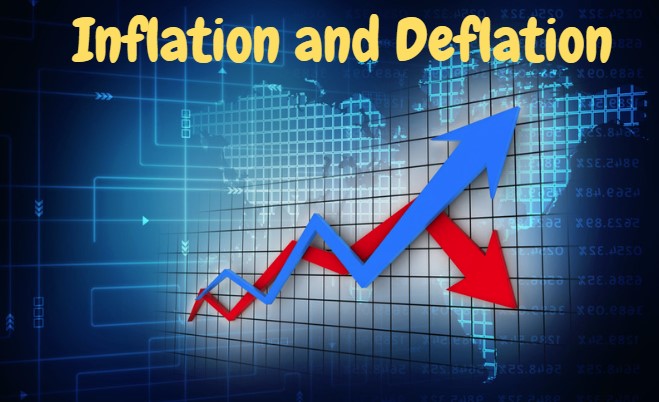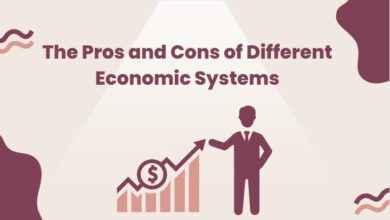Impact of inflation and deflation on the Economy

What is inflation?
Inflation is a sustained increase in the general price level of goods and services in an economy over a period of time. It is usually measured by the Consumer Price Index (CPI) or the Producer Price Index (PPI). Inflation occurs when the demand for goods and services exceeds the supply, leading to an increase in prices. Inflation can also be caused by an increase in the cost of production, such as an increase in the cost of raw materials or labor. Inflation can have a significant impact on an economy, affecting consumer spending, investment, interest rates, income and employment, debt, and international trade. Central banks use monetary policy tools such as controlling interest rates and the money supply to try to maintain a healthy rate of inflation, typically around 2-3%.
What is inflation Deflation?
Deflation is the opposite of inflation, it is a sustained decrease in the general price level of goods and services in an economy over a period of time. Deflation occurs when the supply of goods and services exceeds the demand, leading to a decrease in prices. Deflation can also be caused by a decrease in the cost of production, such as a decrease in the cost of raw materials or labor. Deflation can have a negative impact on an economy, as it can lead to a decrease in consumer spending and investment, an increase in debt and defaults, and can make it more difficult for businesses to make a profit. Deflation can also lead to an increase in unemployment as businesses may have to lay off workers. Central banks typically try to avoid deflation, as it can lead to a downward spiral in economic activity.
What is the difference between inflation and deflation?
Inflation and deflation are two economic phenomena that refer to changes in the general price level of goods and services in an economy over a period of time. The main difference between the two is the direction of the change in price level.
Inflation refers to a sustained increase in the general price level of goods and services in an economy. It occurs when the demand for goods and services exceeds the supply, leading to an increase in prices. Inflation can also be caused by an increase in the cost of production, such as an increase in the cost of raw materials or labor.
Deflation, on the other hand, refers to a sustained decrease in the general price level of goods and services in an economy. Deflation occurs when the supply of goods and services exceeds the demand, leading to a decrease in prices. Deflation can also be caused by a decrease in the cost of production, such as a decrease in the cost of raw materials or labor.
Inflation can have a positive impact on an economy, as it can lead to an increase in consumer spending, investment, and economic activity, while deflation can have a negative impact on an economy, as it can lead to a decrease in consumer spending, investment, and economic activity.
Central banks use monetary policy tools such as controlling interest rates and the money supply to try to maintain a healthy rate of inflation and avoid deflation. The target rate of inflation is usually around 2-3%.
What is the Impact of Inflation and Deflation on the Economy?
Inflation and deflation are two economic phenomena that can have a significant impact on an economy. Inflation refers to a sustained increase in the general price level of goods and services, while deflation refers to a sustained decrease in the general price level of goods and services. Both inflation and deflation can affect various aspects of the economy, including consumer spending, investment, interest rates, income and employment, debt, and international trade.
Consumer Spending
Inflation can lead to an increase in consumer spending, as consumers may feel that they need to buy goods and services before prices rise even further. However, deflation can lead to a decrease in consumer spending, as consumers may delay buying goods and services in the hope that prices will fall even further.
Investment: Inflation can lead to a decrease in investment, as investors may be hesitant to invest in long-term projects because of the uncertainty of future prices. Deflation can lead to an increase in investment, as investors may feel that prices will be lower in the future, making it more attractive to invest in long-term projects.
Interest Rates
Inflation can lead to an increase in interest rates, as central banks may raise interest rates to control inflation. Deflation can lead to a decrease in interest rates, as central banks may lower interest rates to encourage economic activity.
Income and Employment
Inflation can lead to an increase in income and employment, as businesses may raise prices to cover the increased cost of production. Deflation can lead to a decrease in income and employment, as businesses may lay off workers or reduce wages to cover the decreased demand for goods and services.
Debt: Inflation can make it more difficult for borrowers to repay their debts, as the value of the currency decreases over time. Deflation can make it more difficult for lenders to collect on their debts, as the value of the currency increases over time.
International Trade
Inflation can lead to a decrease in international trade, as other countries may be hesitant to trade with a country that has high inflation. Deflation can lead to an increase in international trade, as other countries may be more willing to trade with a country that has low inflation.
Savings and Wealth
Inflation can lead to a decrease in savings and wealth, as the value of money decreases over time. Deflation can lead to an increase in savings and wealth, as the value of money increases over time.
Businesses
Inflation can lead to increased costs for businesses, as they may have to pay more for raw materials and labor. Deflation can lead to decreased revenues for businesses, as they may have to lower prices to remain competitive.
Pension and Retirement Funds: Inflation can lead to a decrease in the value of pension and retirement funds, as the value of money decreases over time. Deflation can lead to an increase in the value of pension and retirement funds, as the value of money increases over time.
Government Spending
Inflation can lead to an increase in government spending, as governments may have to increase social welfare programs to help those affected by inflation. Deflation can lead to a decrease in government spending, as governments may have to reduce social welfare programs as fewer people are in need of assistance.
Inflation and deflation can also have an impact on the overall confidence of consumers and businesses in the economy. High inflation can lead to uncertainty and can erode consumer confidence, while deflation can lead to a lack of investment and can also erode consumer confidence.
To maintain a stable economy, central banks aim to keep inflation at a moderate level and avoid deflation. They use monetary policy tools such as controlling interest rates and the money supply to achieve this. However, it is important to note that inflation and deflation are not always entirely negative or positive and it is important to understand the context in which they are happening. For example, a moderate level of inflation can help stimulate economic growth, while a moderate level of deflation can help curb inflationary pressures.
Conclusion
Inflation and deflation can have a significant impact on an economy. Inflation can lead to a decrease in consumer spending, investment, and economic activity, while deflation can lead to an increase in consumer spending, investment, and economic activity. It is important for policymakers to monitor inflation and deflation and take appropriate actions to maintain a healthy economy. Factors such as employment, interest rates, income and debt should be closely watched. Additionally, the impact on international trade should also be considered. The central bank plays a crucial role in maintaining inflation and deflation in an economy by implementing monetary policies such as controlling interest rates and the money supply.



